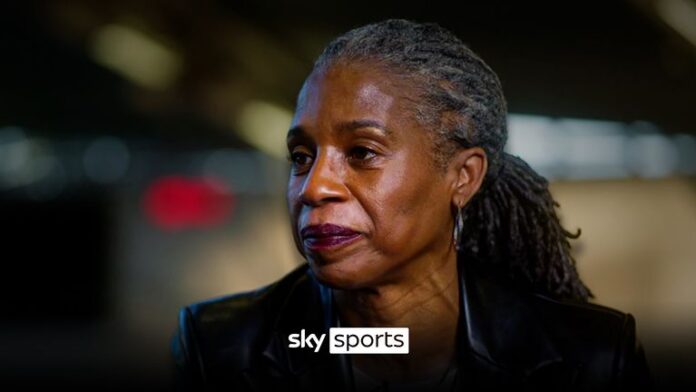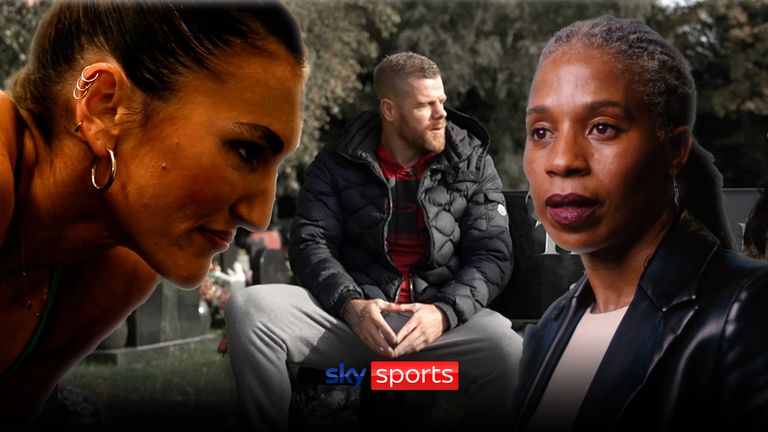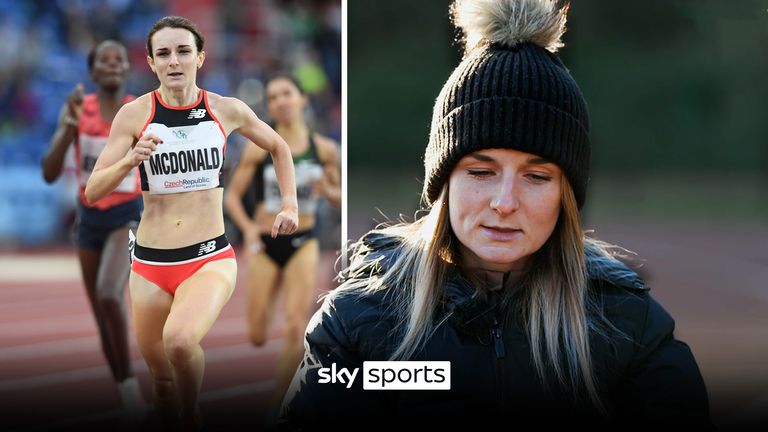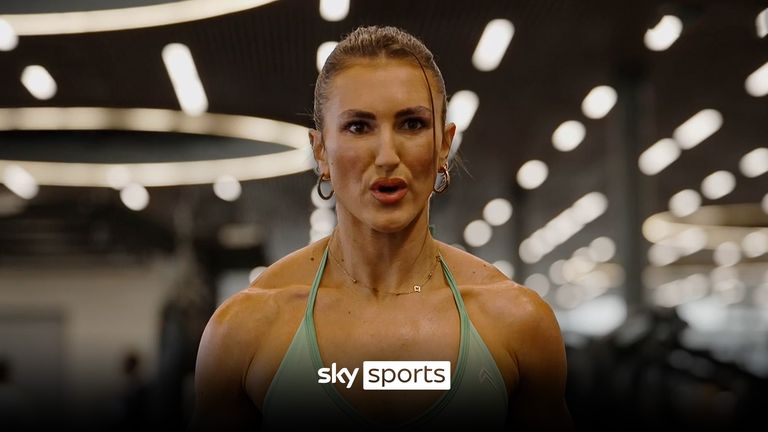Jenny Stoute, Sarah McDonald, Hayley Madigan open up about exercise safety on Sky Sports’ new series Real Talk; Warning: contains discussion of sexual assault, stalking and suicide which some may find distressing
Last Updated: 08/04/24 1:53pm
We should obviously all be able to go outside, to the gym, to the track, to play football – or anywhere – without having to worry about our safety. But the reality is, for many of us, that just isn’t the case.
A 2021 survey by the UN found that as many as 97 per cent of women aged between 18-24 years old had experienced sexual harassment and 70 per cent had experienced harassment in a public space.
And for so many people – mostly, but not exclusively women – they have to keep guards up when leaving the safety of their own homes – day or night.
That doesn’t change when training for a sport. It especially doesn’t change if you’re a woman training for a sport.
We spoke to three brilliant women, all of whom have experienced being harassed or even assaulted while training.
Speaking to Sky Sports News as part of the Real Talk series, Olympic bronze medallist and former Gladiator Jennifer Stoute, middle-distance runner Sarah McDonald and fitness influencer Hayley Madigan discuss their experiences.
Jenny Stoute: I was sexually assaulted at 14, and I’ve never made it public
“One of the most scariest times for me was when I was about 23/24 years old, just training at New River Stadium. When I was working I used to get these phone calls from somebody who said they watched me training and talked about my technique.
“I looked up and I saw a figure in the corner. I wasn’t quite sure whether it was him or not. The following day, I got another phone call saying to me: ‘I still think you could use some work on your arms,’ and I was like: ‘Hold on a second, who are you? You can’t just be calling my phone at work. This isn’t right.’
“When I went to train two days later, I showed the guys at my training group this guy, and said I think he has been following me around. They went to go talk to him and he walked away.
“I didn’t see anything of him for maybe about four or five weeks, nothing. And then someone said to me there’s somebody downstairs at reception that wants to see me. They described the person, and I thought: ‘Oh my god, it’s him. He has actually come to my office.’ Then a little bit of panic.
“Then I just said: ‘No, I’m going down, and I’m going to confront him, and I’m going let him know this is unacceptable. You cannot come to my office, you cannot follow me down, you can’t do this to me, and I’m not going to be intimidated.’
“I did go down there and had a go at him. I brought two of the guys from my office, and I didn’t hear or see anything of him for a long while after that. Then after about two or three months, I was downstairs next to a library and he turned up. I looked at him, stared him in the face, and that was the last time I saw him.
“If I look back on it now, and having two daughters of my own, I would have told them not to have done what I did.
“When I think about it now it’s completely scary. Just little old me doing my thing at training and somebody just happened to earmark me.
“I never went anywhere on my own. I was too scared. I don’t like walking the streets at night. To me, if I see a woman walking the streets at 10.30pm, I just think why are you doing this? Because, opportunity.
“The guys at training always walked me to the train station, because I didn’t know whether this person was going to turn up, whether he’s going to be angry with me because I was angry with him. So it did put a dampener on my own sort of security for myself.
“Men do feel they can intimidate a lot of women. So we have no choice. We have to protect ourselves.
“I don’t think it’s so much educating the women, we have to educate the boys and make them understand how to protect us as well.
“For guys to understand how intimidating this really is. It could be your mother or your sister, it could be anybody at the end of the day. We have to all understand the fear factor of how women feel.”
Thinking of where her strength to confront her stalker came from, Stoute revealed her harrowing story of sexual assault as a 14-year-old…
“This is going really quite deep, because of this whole thing about women and being intimidated. I will tell you the reason why I was so strong, but I’ve not really made it public. When I was younger, I was sexually assaulted.
“When I was 14, I was sexually assaulted when I was back in Barbados by a family member. And it was the darkest time of my entire life. At that age, I tried to commit suicide.
“The craziest thing for me, I think, is if I had succeeded, I would have been a troubled child who couldn’t control herself. But I remember when I made the Olympic Games in 1988, and I was crying my eyes out. I was just taken aback by the whole scenario.
“A man assaulted me, and my whole family went against me, because it was somebody who was in the family. And then when I look at it now, I think it’s the reason I’m so strong about myself and about my girls.
“When I look back, and I look at all the intimidation I’ve had, and how I stand up for myself, it all stems from what happened to me as a girl that I will never let happen to me again.
“I’ve never told anyone. It’s life, though, isn’t it?
“I’m not a victim. I don’t say: ‘Oh my God, my life can be so different.’ I believe all things I’ve gone through in my life have got me to where I am, and I love who I am now.
“But I will always be strong about who I am and where I’m going. I will never allow somebody to take me out because I could have taken myself out when I was younger, and I didn’t. So I have a right to be here.”
Sarah McDonald: I froze in the moment, and went into shock
“It was just a Wednesday in March and it was daylight in the morning and I was warming up for a session. I wasn’t alone, I had someone on the bike behind me, but probably about 50 metres behind because we’d have to negotiate a little gate in the canal.
“Before I knew it, two guys on a moped came from behind and grabbed my bum and started shouting horrible things at me, and I don’t even remember what they said. I kind of just froze in that moment.
“Everything everyone tells you about being assaulted was true. I just didn’t know what to do. Thankfully, the person I was with shouted from behind and they then sped off in the distance. But it took me a good few minutes to actually realise what had happened and I kind of went into shock for a little while.
“I still somehow did my session as normal and it wasn’t until I got home, really, I reflected on what had happened.
“I think the scary thing for me was that I wasn’t alone and it was the fact I wasn’t alone that stopped them. Actually thinking about what could have happened, that’s what scared me.
“It really did impact my life, and running is my life. I spoke up about it at the time because I knew of people who would never run again or run alone again as a consequence of what happened. So I just wanted to raise awareness to stop this happening. But I don’t know how that can ever stop, really.
“It did kind of take away the freedom [of running]. Normally you would go for a run and it would clear your head and you wouldn’t have to think about anything.
“Running is my job and it’s like my livelihood, and it made that really stressful and took away the beauty and simplicity of running.
“You wouldn’t shout at someone just walking the dog, so why shout at someone running? And it does make you think about your outfit choices.
“When I was younger, I used to wear tight lycra shorts all the time, wherever I was. But now I’d wear something a bit more conservative, like leggings or baggier shorts.
“I think for men, if a man is running, make yourself known to a female. Say you’re coming up from behind. Do a big cough, make a noise and make them know you’re coming, because it can be really frightening if someone just comes past you.
“And I would say, what are people planning on achieving from catcalling a girl out of your white van window? What do you think is going to come of that other than them probably feeling hurt.
“It’s really difficult because I don’t know how you would ever enforce anything. I’ve thought about it long and hard but I think it’s just a self-awareness of what you’re doing and your actions, and what implications that might have on women and women’s sport.”
Hayley Madigan: I’ve experienced many different situations in gym, like a lot of women do
“My full-time job is a fitness social media influencer. I do hate the term influencer, but I tend to say content creator.
“I’m also a trainer and I have an app called Growgirl. So I train thousands of women, whether it’s in the gym or at home.
“I competed at pro level in bodybuilding. I don’t compete anymore, but I still practise the sport and practise bodybuilding pretty much every day.
“It’s the unsolicited staring and quite often as well. Unfortunately, that staring can then turn inappropriate and it can make you feel very intimidated by that individual and can put you off the gym.
“No matter what I’ve got on, whether I’m wearing a sports bra and shorts or jogging bottoms, it doesn’t matter. They think that women are there to be chatted up because they don’t understand that we’re there just for the same reasons they are: to get strong.
“I’ve had it several times, actually quite recently, when I’m on a piece of equipment and they go: ‘Can I jump in with you?’ And I’m like yeah, it’s a busy gym, you can. I’m not going to be rude. But then they take it as an invitation to chat you up and want to get your phone number within 10 minutes.
“You are here to train, so don’t do that. Please understand there’s barriers. You’re overstepping the mark. It’s a gym. It’s not a club, it’s not a bar, it’s not a pub. But yet it’s an easy way in for a lot of individuals because they see women in there on their own, maybe listening to music.
“Yes, many a time [felt unsafe]. I had an incident where a man followed me home from the gym and I had to walk past my house because I didn’t want him to know where I lived.
“I had to walk round in a couple of circles and go to the back of the house where I felt safe. And that’s because that individual found me from the gym looking at me and then was following me.
“I’ve been a member of a gym for 13 years, and I’ve experienced many different situations, like a lot of women do. Whether it’s a verbal comment, a situation where they give you unsolicited advice, abuse or inappropriate behaviour, it’s constant.
“I always say to men, make women feel safe by understanding they’re not a threat. We feel safe with a man that would not inappropriately look or stare or make judgement, but just a general friendly smile, looking out for their sisters, their mothers, their aunties, their daughters and talking about it.
“What can men do more? If they see an incident happen, help that person out, because a lot of the time they’ll walk past and think: ‘I don’t want to get involved. It’s nothing to do with me.’ If they see something happen, report the incident, go to your local police station. Or if it’s in a gym, tell the people that are on duty, please look out for us. That’s all we need.”
If you are affected by these issues or want to talk, please contact the Samaritans on the free helpline 116 123, or visit the website www.samaritans.org
Follow Real Talk on Sky Sports News’ digital and social channels and watch the extended interviews on Sky Sports News, YouTube and on demand.
You can also download the podcast on Spotify and Apple, where you can listen to all the interviews and take a closer look at the meaningful conversations with an expert.
Source : Sky Sports

















